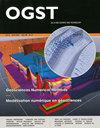LNG换热器板翅结构应力与急停运行过程的关系
IF 1.8
4区 工程技术
Q4 ENERGY & FUELS
Oil & Gas Science and Technology – Revue d’IFP Energies nouvelles
Pub Date : 2021-01-01
DOI:10.2516/ogst/2021062
引用次数: 2
摘要
为了保证LNG换热器在紧急停止运行过程(ESOP)中的安全运行,提出了一种研究该过程中板翅结构(PFS)应力的数值方法。分析了LNG换热器中PFS应力与ESOP的关系。结果表明,当HMR压力大于5 MPa时,ESOP初始阶段PFS的最大等效应力大于ESOP最后阶段。最大等效应力在大于180 K时随平衡温度的升高而增大,在ESOP的最后阶段达到峰值。最大等效应力在ESOP的最后阶段大于其他阶段,并随着平衡压力的增大而增大。当ESOP中温差大于5 K时,其对PFS应力的影响较为明显。在ESOP中,平衡温度和温差应分别控制在240 K和5 K以内。本文章由计算机程序翻译,如有差异,请以英文原文为准。
The relationship between stress of plate-fin structures and emergency stop operation process in LNG heat exchanger
For insuring the safe operation of LNG heat exchanger in the Emergency Stop Operation Process (ESOP), a numerical method is proposed to investigate the stress of Plate-Fin Structures (PFS) in that. The relationship between stress of PFS and ESOP is analyzed in LNG heat exchanger. The results will be obtained that the maximum equivalent stress of PFS is greater at the initial stage of ESOP than that at the last stage when the HMR pressure is more than 5 MPa. The maximum equivalent stress increases with the equilibrium temperature when is greater than 180 K and reaches peak value at the last stage of ESOP. The maximum equivalent stress is larger at the last stage of ESOP than the other stage and increases with the equilibrium pressure. When the temperature difference is more than 5 K in the ESOP, the influence of that is obvious for the stress of PFS. In the ESOP, the equilibrium temperature and temperature difference should be controlled within 240 K and 5 K, respectively.
求助全文
通过发布文献求助,成功后即可免费获取论文全文。
去求助
来源期刊
CiteScore
2.70
自引率
0.00%
发文量
0
审稿时长
2.7 months
期刊介绍:
OGST - Revue d''IFP Energies nouvelles is a journal concerning all disciplines and fields relevant to exploration, production, refining, petrochemicals, and the use and economics of petroleum, natural gas, and other sources of energy, in particular alternative energies with in view of the energy transition.
OGST - Revue d''IFP Energies nouvelles has an Editorial Committee made up of 15 leading European personalities from universities and from industry, and is indexed in the major international bibliographical databases.
The journal publishes review articles, in English or in French, and topical issues, giving an overview of the contributions of complementary disciplines in tackling contemporary problems. Each article includes a detailed abstract in English. However, a French translation of the summaries can be provided to readers on request. Summaries of all papers published in the revue from 1974 can be consulted on this site. Over 1 000 papers that have been published since 1997 are freely available in full text form (as pdf files). Currently, over 10 000 downloads are recorded per month.
Researchers in the above fields are invited to submit an article. Rigorous selection of the articles is ensured by a review process that involves IFPEN and external experts as well as the members of the editorial committee. It is preferable to submit the articles in English, either as independent papers or in association with one of the upcoming topical issues.

 求助内容:
求助内容: 应助结果提醒方式:
应助结果提醒方式:


